“What games does Disco Elysium remind you of?” Ask around and the top answer is certain to be Planescape Torment. No surprise there, as the connective tissue between them is obvious. The visual perspective of the world is the same, the heavy focus on dialog and being able to choose a wide variety of ways to roleplay your character, and consequently those choices changing the way the world and the people in it react to you. And the creators of the game, Estonian developers ZA/UM, readily and gladly speak of what an influence Planescape was on Disco Elysium.
Yet Disco Elysium's approach to choice and possibility is better anticipated by a scene in Knights of the Old Republic 2, an earlier Bioware game whose limited narrative options and Star Wars setting might at first make it seem like the polar opposite of Disco's grounded, flexible storytelling. But there's a moment on the planet Nar Shaddaa between you and a beggar. The beggar asks if you can spare him some credits. Your options are to either give him the credits, or to not give him the credits, followed up by threatening to kill him if he doesn’t leave you alone. It's the type of simplistic binary that typified Bioware's games, and one that follows the studio's pattern of inserting throwaway side-quests based on complicated sociological issues. In other words, about as from from Disco as you can get…until you look at what happens next.
Choose to give him credits and your companion Kreia will speak up to tell you all about why that was such a foolish decision, painting a future where your mild philanthropy causes the beggar to gather too much attention from others, promptly getting mugged for the credits you gave to them. She goes on about how expressing kindness and solidarity to others can lead to just greater pain and firmly pushes you to internalize this lesson. If you decide to load the save just before that conversation and take the other route, denying the beggar the mere five credits (as well as going so far as to threaten to kill him!), Kreia will speak up again, having a speech at the ready about how your cruelty just adds to more cruelty, and oh, how terrible you are, to not give that beggar a pitiful five credits - and literally threaten to kill him if he doesn't leave you alone. Doesn't matter which path you choose, doesn't matter what beliefs you decide you want to have in this character, Kreia will approve of none of your choices. Not only that, but the smallest kindness is painted in the same despairing light as wildly unnecessary cruelty. To give five credits is depicted as being equally bad as denying someone five credits and threatening to kill them just for asking.Small decisions can only leap to extreme outcomes, all beliefs and actions are bad, and all beliefs and actions are equally bad.
When Disco Elysium is at its worst, I think of Nar Shaddaa and knowing that any choice l make will end with me being berated - though why Disco chooses such a path couldn’t be more different from KOTOR 2. With Kreia, the purpose of the moment is a shallow but sincere philosophical provocation, trying to get you to look at the world and your choices in a different way. For Disco Elysium, the issue is a lack of sincerity, a defensive posture adopted to keep you from getting too close to what is at its core—an ache to believe in the revolutionary politics and possibilities of communism, and a fear of the sincerity it requires.
Even as Disco reaches beyond the ambitions of weaker, far more limited morality and choice systems in games like Mass Effect or Bioshock Infinite, it does not fully abandon the ideological narrative shield those systems offer. As endless interviewers have gotten to find out, questioning AAA developers and publishers about politics in their video games gets you a mix of "We just like to raise questions", "This is really all up to what the PLAYER thinks," and "What's politics? Never heard of it."
To its credit, it does not deny the existence of politics, or try to make them vague and undefined metaphors one can say mean nothing at all if questioned about them. But playing through, you'll inevitably find that it doesn't matter what kind of politics you try to believe in - no matter what position you take, the game will sneer at you for it. Choose to be a fascist? Rightly, the game shits on you. Opt to believe in liberalism? No safety there, your inner thoughts will chime in to mock you for an indecisive position that only upholds the status quo. Start talking about being a communist? You might've thought you'd get a pat on the back for that after the other two got trashed, but your reward is the same. Speak of how the system is unjust and people are in poverty for no reason and in no time at all, the game uses your inner monologue to paint you as someone calling for purges and mass executions.
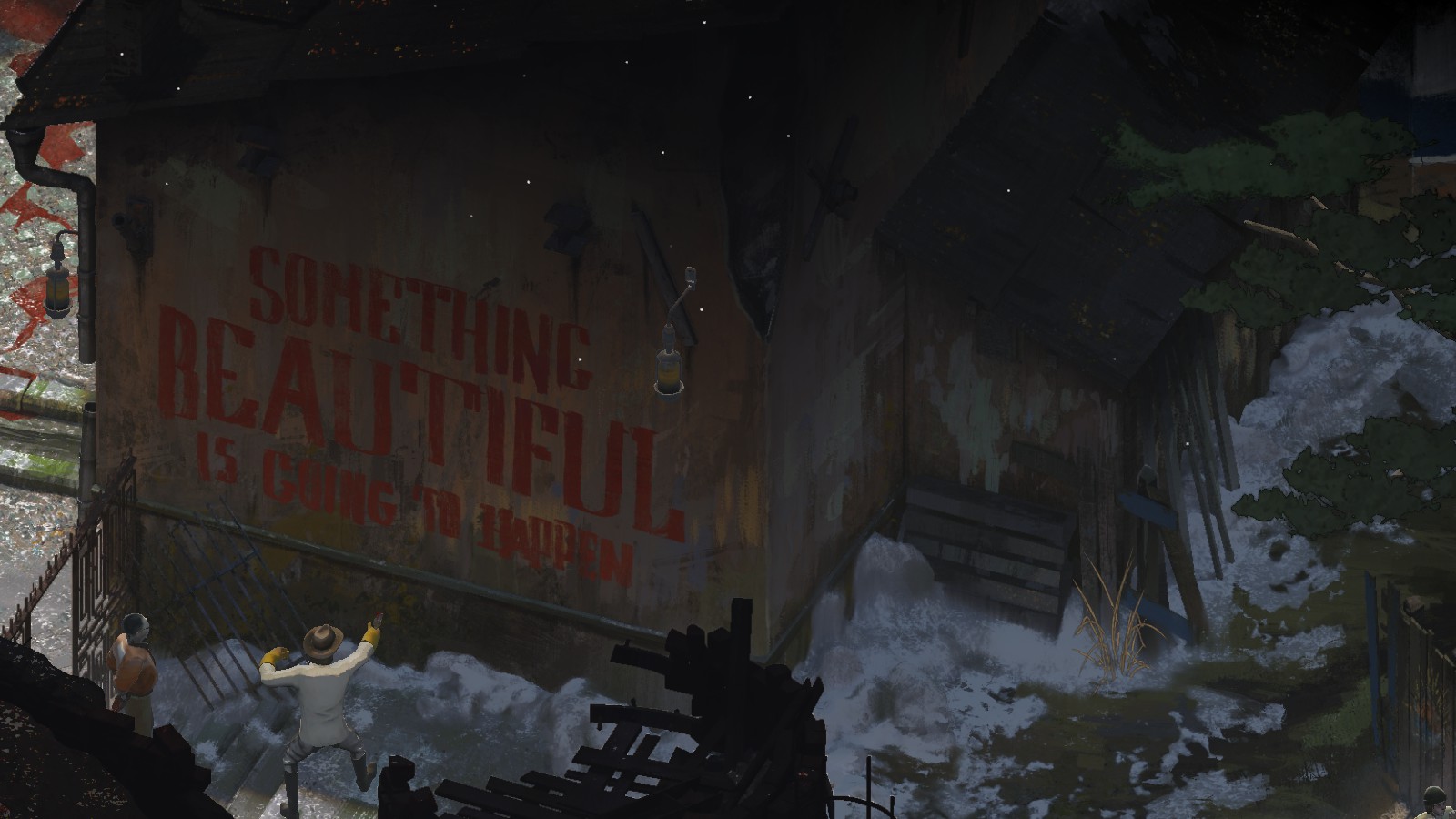
Ah, you think you've found the way out by choosing none of these, keeping commentary to yourself? Or, quite reasonably, deciding you need more information and time to think before you can come to a sensible conclusion about what you actually believe? No good, Disco Elysium has it out for you too, sneering at you for being so cowardly that you try to avoid having an opinion at all. There is nothing you can believe—or not believe—where it won't rip into you for doing so.
Some of this is a clear commentary on the player character himself, Harry Du Bois. Disparaging whatever thought you have, even if it contradicts previous insults you had of other thoughts, is not uncommon for someone filled with self-loathing. I would know. But Disco doesn't stop there: it throws the kitchen sink at you when it comes to emotional, and consequently, political defense mechanics.
These defenses grow out of being hurt, personally and politically. Harry has gotten hurt. The city of Revachol has been hurt, and the Insulindian isola on which it resides has also been hurt. The entire world still bears the scars of a revolution that was crushed by the wealthy and powerful. These same hurts have been felt within our own world. If we didn’t have them, Disco Elysium would’ve never existed. That sting of failure, and the fear that trying again would just reopen the wound, are all necessary to _Disco Elysium_’s existence.
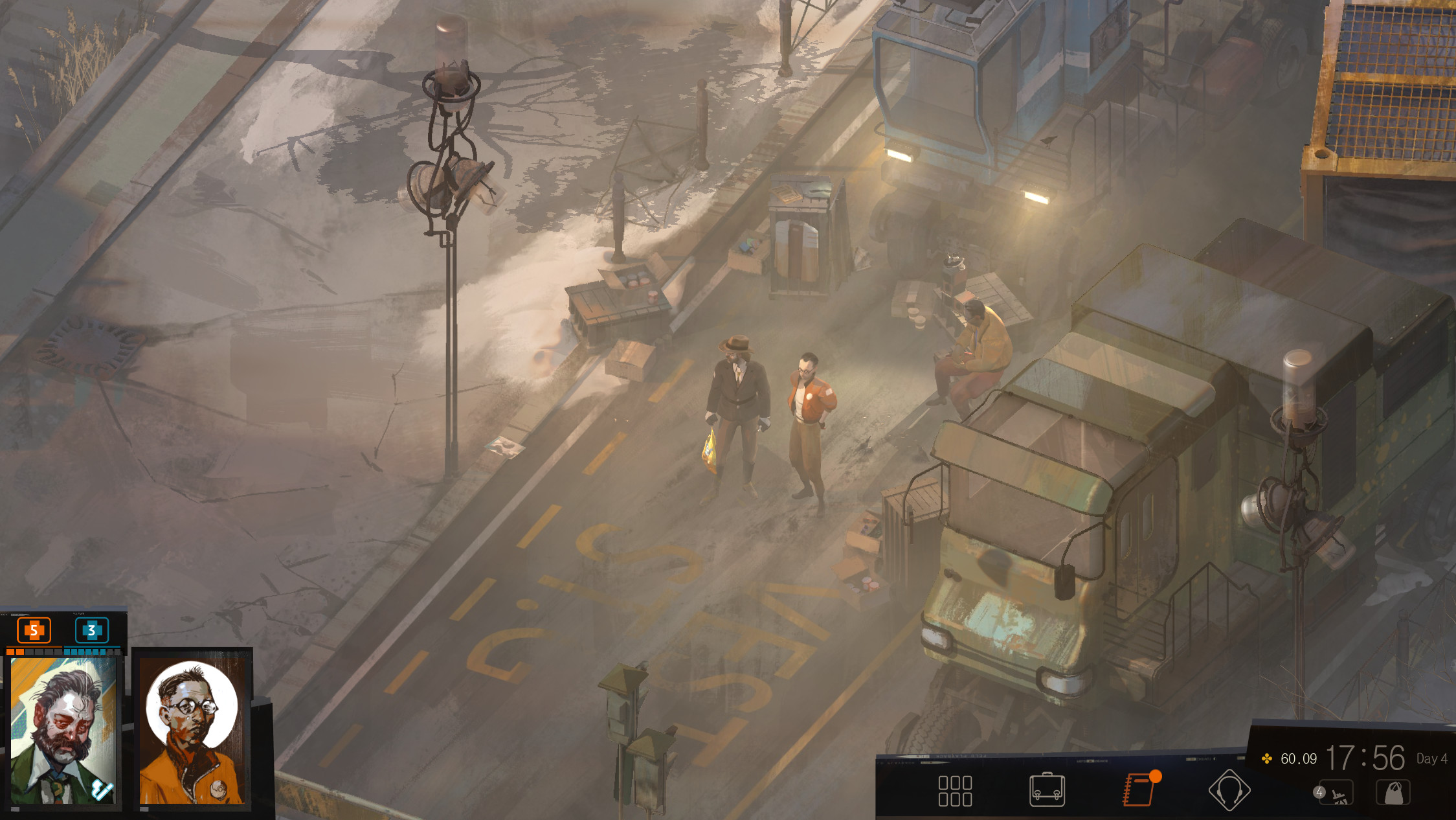
Three characters hold the key to understanding how Disco Elysium bobs and weaves its way around sincerity, politics, and the connection between the two. The first two are obvious: Harry DuBois and his partner Kim Kitsuragi. The third is the most aggressively arch and confrontational character in the whole game, Cuno.
Cuno is the least directly connected to politics in _Disco Elysium_—though politics surrounds his and everybody else’s life (no matter how might someone try to avoid it), but as an adolescent who is doing speed, throwing rocks at a hanging corpse behind a hotel, and hurling slurs at cops, he’s hardly the sort to be weighing the various pros and cons of socialism versus anarchism versus liberalism.
Where he’s most important is being an early and deliberately unsubtle expression of sincerity, as well as how and why one would avoid showing any of it. Cuno’s consistent and consistently raw aggression towards Harry, Kim, the corpse hanging in the yard, and any other subject is already a common way to avoid having to share one’s feelings. Unprompted, unadulterated anger is an easy way to avoid having to show any emotion that might be "soft", and even proudly ignorant boys like Cuno know implicitly that soft emotions are a big flashing sign of vulnerability and showing them is a grand gamble that someone won’t crush them, and you, in their hands.
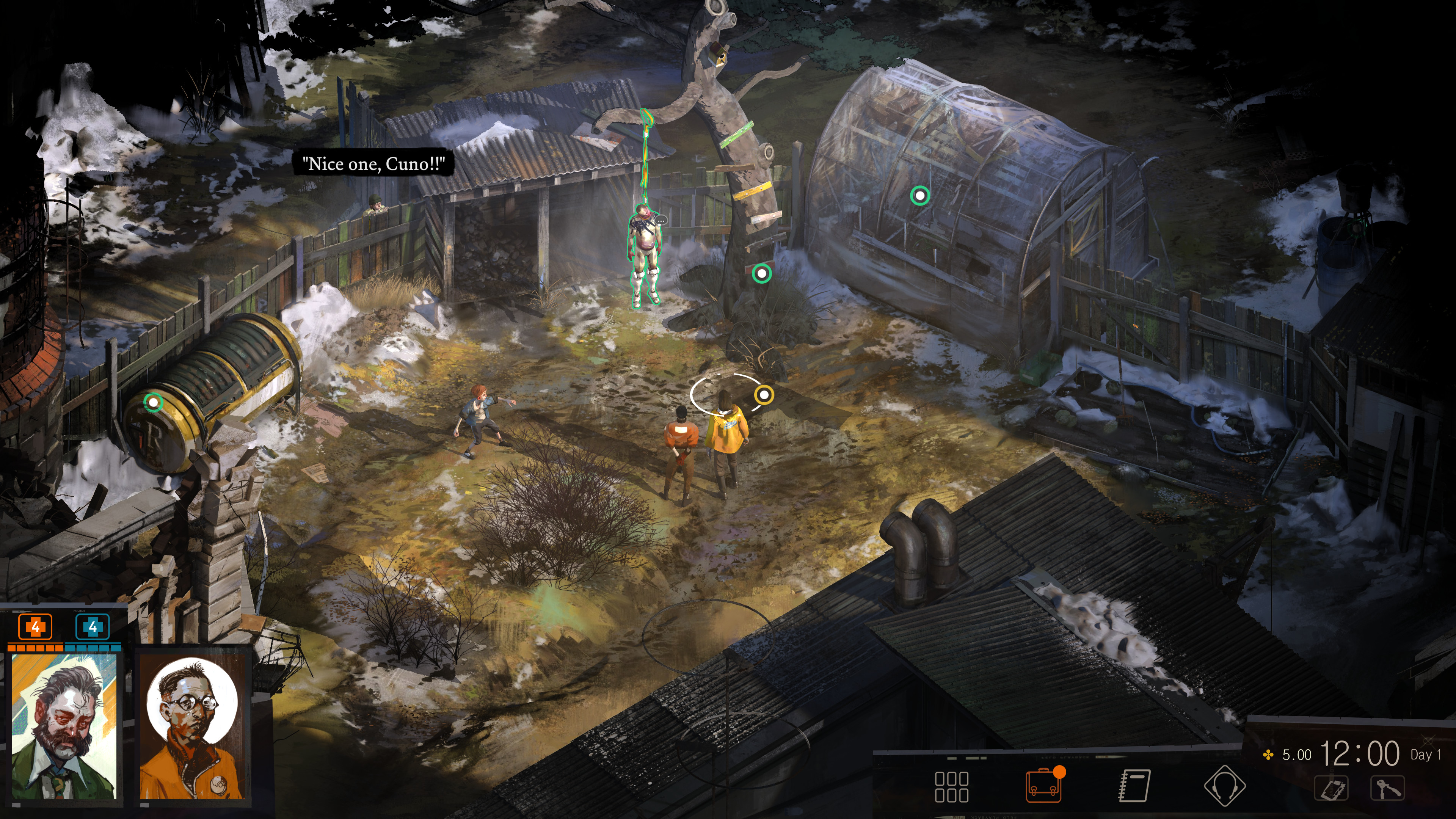
But there’s an early stat check from the game you can pass to notice that Cuno always refers to himself in the third person. No “I don’t care” or “I’m a drug freak and I’ll rip your throat out with my teeth if you touch me, copper”. Always “Fuck does Cuno care?” and “Cuno doesn’t know fuck about the murder”. Passing the check goes beyond noticing: your inner thoughts will quickly surmise that Cuno’s speech patterns are a deliberate choice to distance himself from himself so as to harden up and not show vulnerability. Finally, you get the option to remark on that behavior and why Cuno is doing it, to Cuno’s face.
Disco Elysium is aware of these techniques, and so, is aware of itself. It is aware of how one behaves, how one speaks, the deliberate and unconscious choices made around one’s true feelings, the many different ways one can hide them, and why they’d hide them. As a murder mystery, it’s only natural: what would a detective story be if nobody told any lies to hide a truth that must be uncovered? People lie about their feelings as much as they would lie about being involved in a murder. The story knows what it’s doing, and it lets you know it knows what it’s doing.
It doesn’t tell you that this level of self-awareness—telling others you know exactly what you’re doing and why—can itself be a defense mechanism, but that’s more important later.
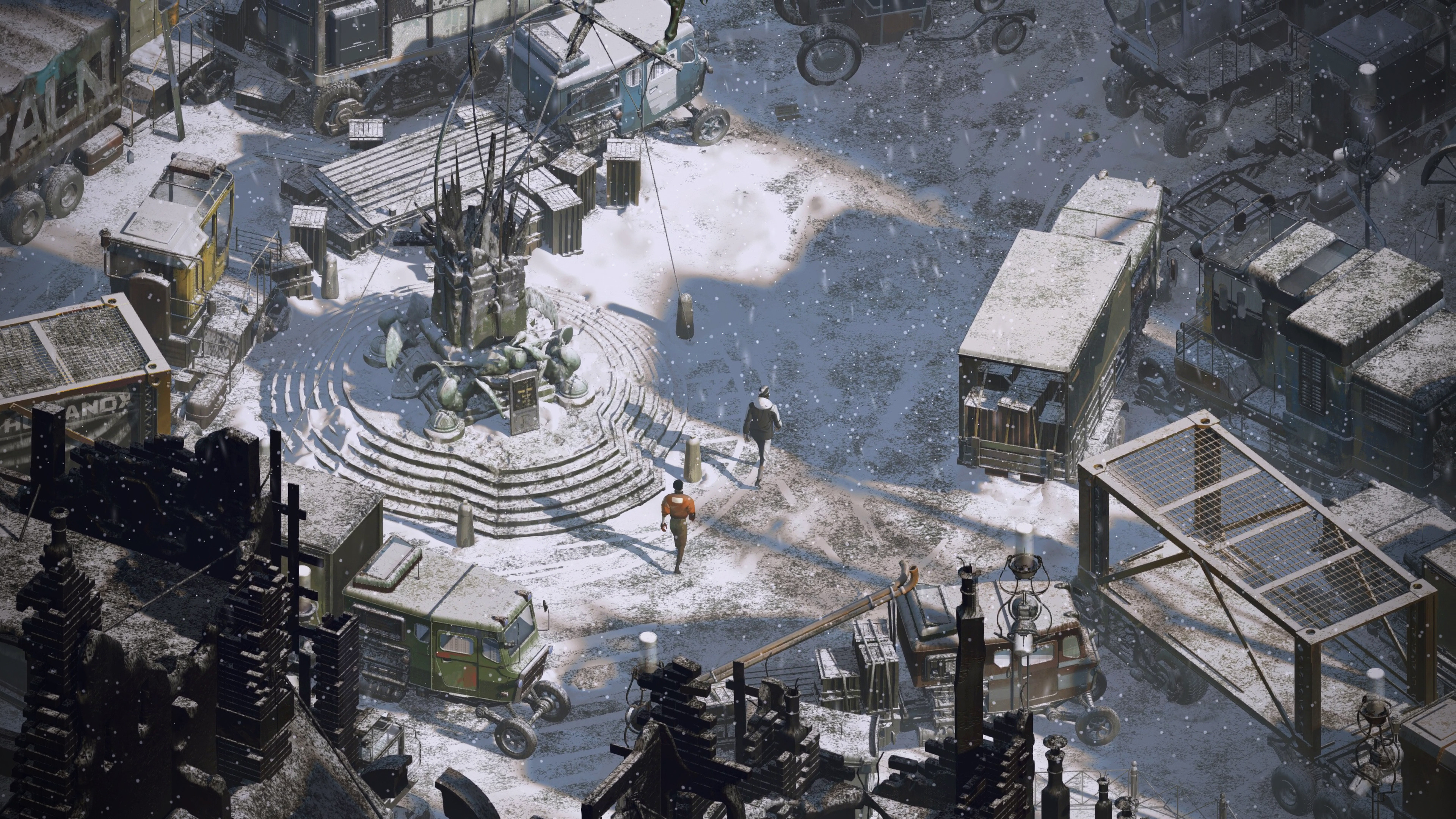
The connection between emotional sincerity and politics is more obvious when it comes to Kim Kitsuragi. Kim doesn’t lie about his feelings or about his politics - he just doesn’t let people into knowing about either of them. I would say that Kim is the most sincere and emotionally available part of the main cast through the whole story, which is funny as hell, because his approach to his life, his job, his own internal feelings and his political beliefs is firmly stoic. Others will lie about what they think, put on a performance of being an entirely different person, intentionally take extreme actions and positions to keep the truth of what’s inside of them hidden away, but Kim will put his arms behind his back, look you dead in the eye, and tell you honestly: “I’d rather not talk about it.” Like others, he buries feelings, his sincere thoughts and beliefs, but he also tells you, sincerely, that’s exactly what he’s doing. He exists in an interesting dual state, where he is hiding his inner thoughts and bone deep beliefs, but Kim’s doing so is also a genuine part of his personality, and he’s consistently honest about why he does it. Unlike almost everyone else in the game, you will be hard pressed to find a moment where Kim is insincere, but getting him to share what’s inside of him, to put his heart on his sleeve for even a moment, takes just as much work as it does with Cuno and the people of Revachol—more, really, since Kim’s stoic nature is firm as a rock. Other people’s defenses are frequently shakier. Cuno might unconsciously grasp it, but Kim’s understanding is clear: sharing what’s inside of you without pretensions or shields is an easy way to get hurt.
Then there’s the player character, Harrier “Harry” Du Bois, a never-ending, raging storm of feelings and thoughts. Even if picking actions and dialog choices intentionally putting you into “boring cop” personality profile, his mind is constantly boiling over with internal conversation, different impulses, assumptions, fears and beliefs crackling to life at all hours of the day, frequently arguing with each other too. It’s a dramatization of the real process of internal conversations taken to its absolute extreme. Harry is proposing ideas, contradicting those ideas, insulting himself, insulting the insults of himself, it’s a nonstop cacophony of self-loathing through a million different possible filters.
Which gets to one of the tricks about Harry and Disco. The story is set up, as so many RPGs are, with Harry’s amnesia allowing you to assemble his skillset and personality as you please. Especially for games pulling inspiration from Planescape: Torment, that’s how these things tend to go: build your own character andmake your own way through the story that’s been constructed for you, loosely replicating the experience of tabletop roleplaying. Harry can be a braggart or go through Revachol with almost pathological diffidence. He can be a bleak fatalist, telling everyone who will listen how utterly fucked things are. But there is a core aspect to Harry you cannot escape, no matter how you choose to throw him through the city of Revachol. Harry is a fuckup, and he hates himself.
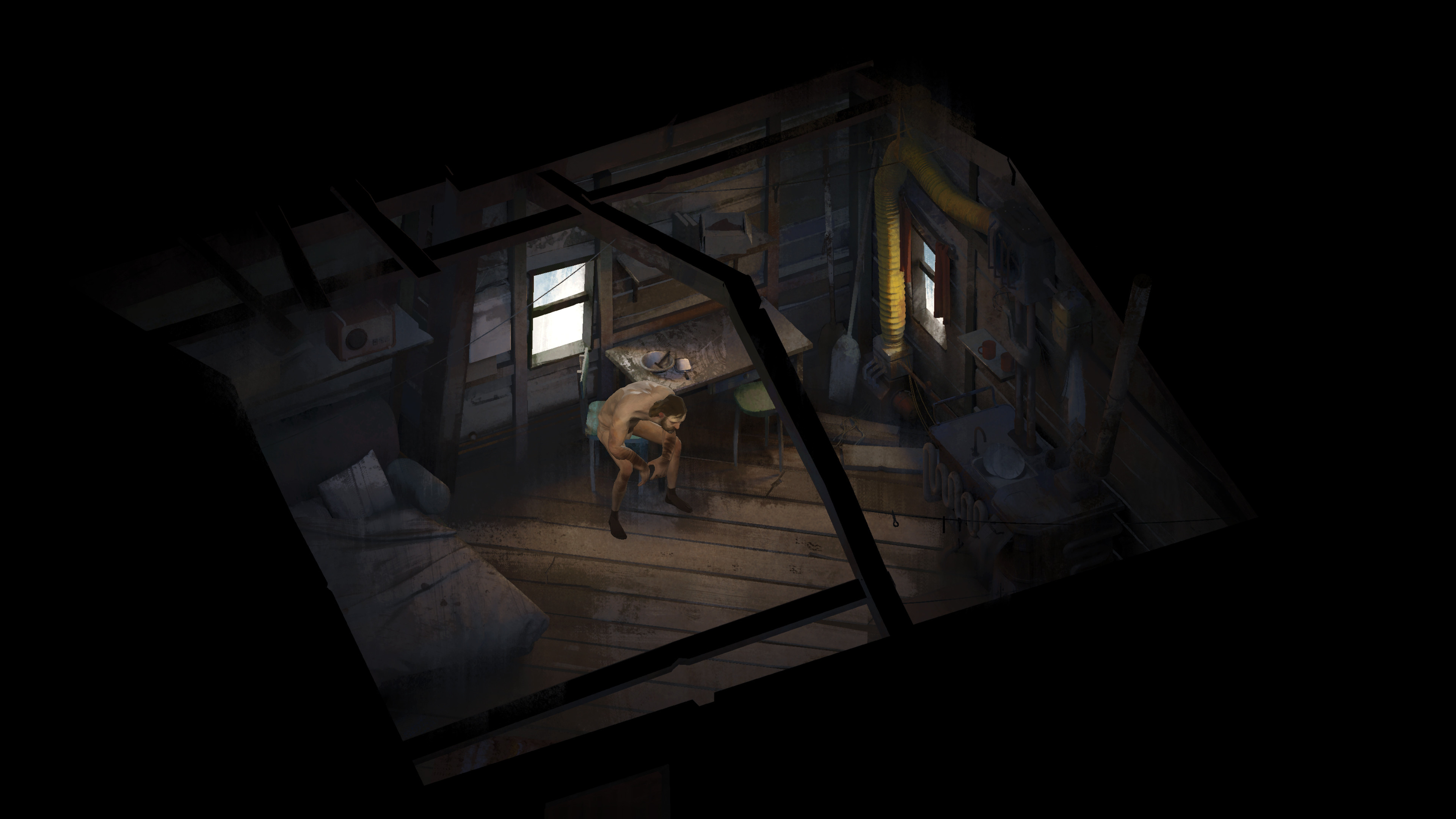
Everything you do is in reaction to that. The first wave of reality you’re hit with as Harry, waking up in your destroyed hotel room having given yourself alcohol-induced amnesia, establishes this foundational aspect to Harry's character. But as you roleplay him, you find out that all paths and personalities lead back to stunted attempts to not have to deal with his mistakes and self-loathing. Even choosing to be an “Apocalyptic Cop” that talks about how the world is meaningless and we’re all going to die anyway is a tactic to avoid having to deal with one’s mistakes and how Harry deeply hates himself. Wallowing in the loathing and giving up on the world is a miserable kind of comfort, but it is at least comfortable.
I say this from experience. As someone who has struggled with depression for more than half my life, I could pinpoint each dodge and defense Harry can use to one I’ve used myself. But nothing in Harry reminds me of myself in the worst pits of more than the choices tied to the Apocalyptic Cop copotype. I can recall days, months, years spent with the exact same thoughts in my head as Harry, throwing myself into active helplessness so I could at least enjoy not having to actually do anything about it. I hated myself and was miserable every single day, but at least I always had a reason to never do anything about it, to open up my heart enough to have hope again, which meant nobody could ever stomp all over it.
So what does all of this have to do with communism?
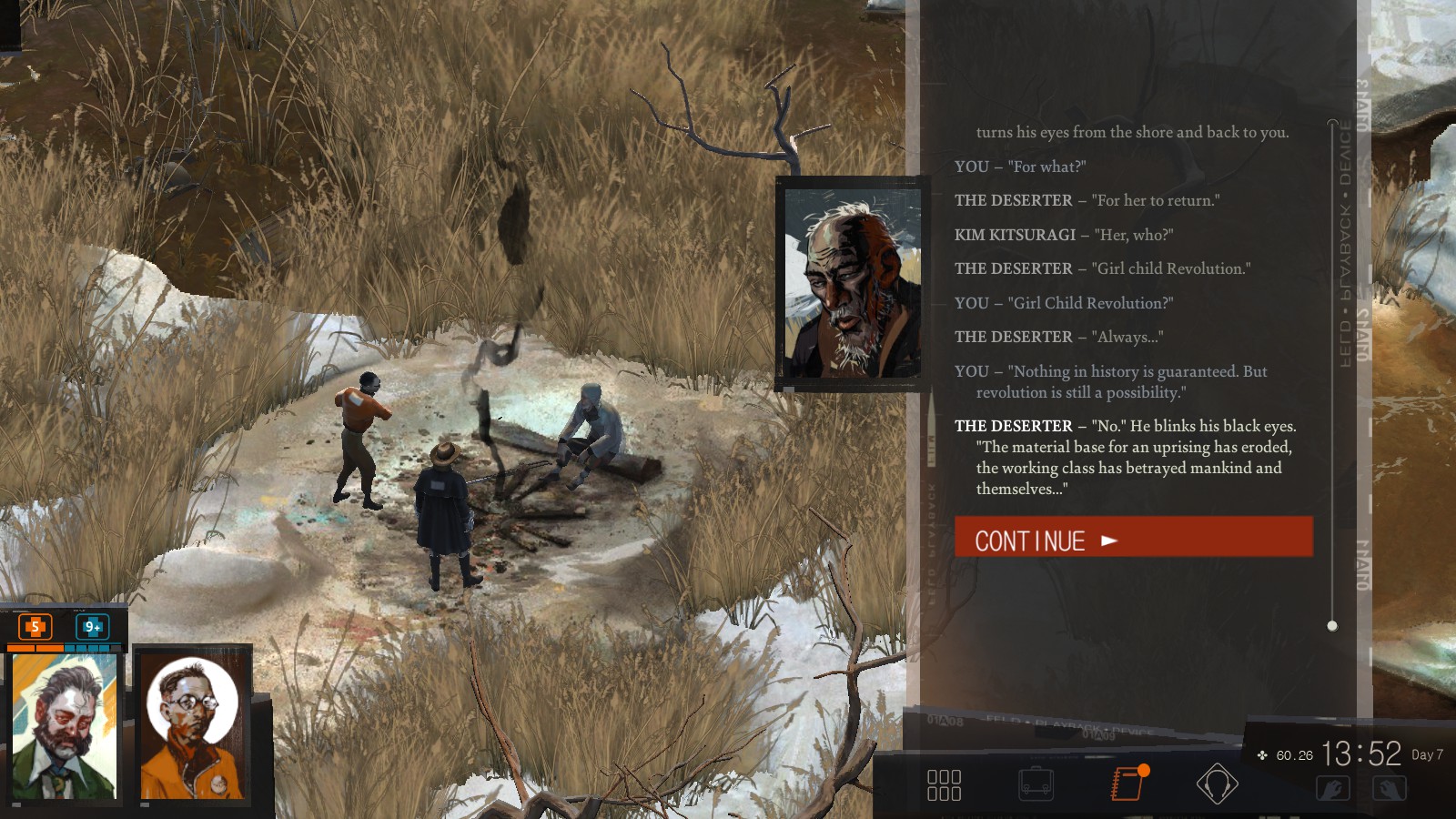
For even the most materialist of materialists within socialist and communist thinking, this is still an ideology, a philosophy, tied up in hope. It requires a belief that a better world is possible, that we can, should, and will do more for each other. That people can come together and help each other, and despite everything in the past and all the attacks raining down on us now and the disasters to face us in the future - we can make something good for people.
This is the kind of ideology that’s just asking for people to grind the heel of their boot into it. Revachol’s reality, and the reality of the country it sits inside of, and the reality of the world that country resides in, is that a bunch of communist revolutionaries rose up years ago, and then were promptly smashed to bits by the ruling class, sold out by the comfortable liberals. Harry has had his life broken to bits by his own failures that has culminated in a rabid despair that has figuratively and literally destroyed everything around him, drowning his brain in enough alcohol that he can’t remember who he is, much less how both the world and his own actions haves hurt him. If you try and push him towards communism as I did, his brain — and consequently, the game itself—rebels against it. Which can be quite surprising, given that ZA/UM are rather open with their beliefs, going as far as directly shouting out Marx and Engels for giving them political education for one of their acceptance speeches at the Game Awards.
Despite the developers’ straightforwardness about their beliefs, Disco Elysium cannot let itself be vulnerable - not for very long, or very often. Like Harry himself, it’s still scared of opening up, still afraid of being mocked, hurt, torn down and made for a fool for wearing their heart on their sleeve and believing things could ever be different. The rare moments that emotional vulnerability does come by in Disco Elysium, it is quick to stuff it back down and suffocate it with all sorts of qualifications around why and how it showed its true hopes and fears inside of itself. The game quickly retreats back to treating everything as a joke, or drenching you in the bleakness of ever dreaming of having something more ambitious and grander for humanity than fleeting minutes of genuine kindness between people in a small neighborhood. It’s not limited to sneering at big picture dreams of revolution and an entire changing of the socio-economic status of the world, either. Something as small and human as pursuing a sincere interest in art? One chunk of your inner thoughts will encourage it, and another will go on an inexplicable ableist tirade about how this is ‘autism’. An individual’s hobbies are where Disco feels most safe in regularly opening up — Kim’s love of cars, the dicemaker and her dice, the ravers and their music — but almost universally it cannot resist a reflexive urge to ‘balance’ this by piping up to comment “This is stupid and pointless, isn’t it?”, with any field of interest you send Harry into getting the worst of it.
The thoughts inside Harry’s head aren’t just speaking to him, or to you the player, but the game speaking to itself. It is a journey for Harry, trying to find a way to be sincere with himself and about himself with others, but it is a journey that he does not finish by the story’s end. Neither does the game.
There is one moment in the story that should have been a massive exception to this, but ends up typifying the anxieties and emotional shields that plague Harry: the conversation with the Insulinidian Phasmid.
The phasmid is a towering insect that hardly anyone but a pair of cryptozoologists (and if you so choose, Harry himself) believes is real. After Harry and his partner question the killer they’ve been chasing all week, the bug emerges from the reeds it has been camouflaging itself in. With no reason to believe in it but a leap of faith, it turns out to have been real the whole time! If you took that leap by doing a mass of tasks for those cryptozoologists searching for the phasmid, you’re rewarded with a pheromone that lets you get close enough to the bug to speak to it.
And what a conversation it is.
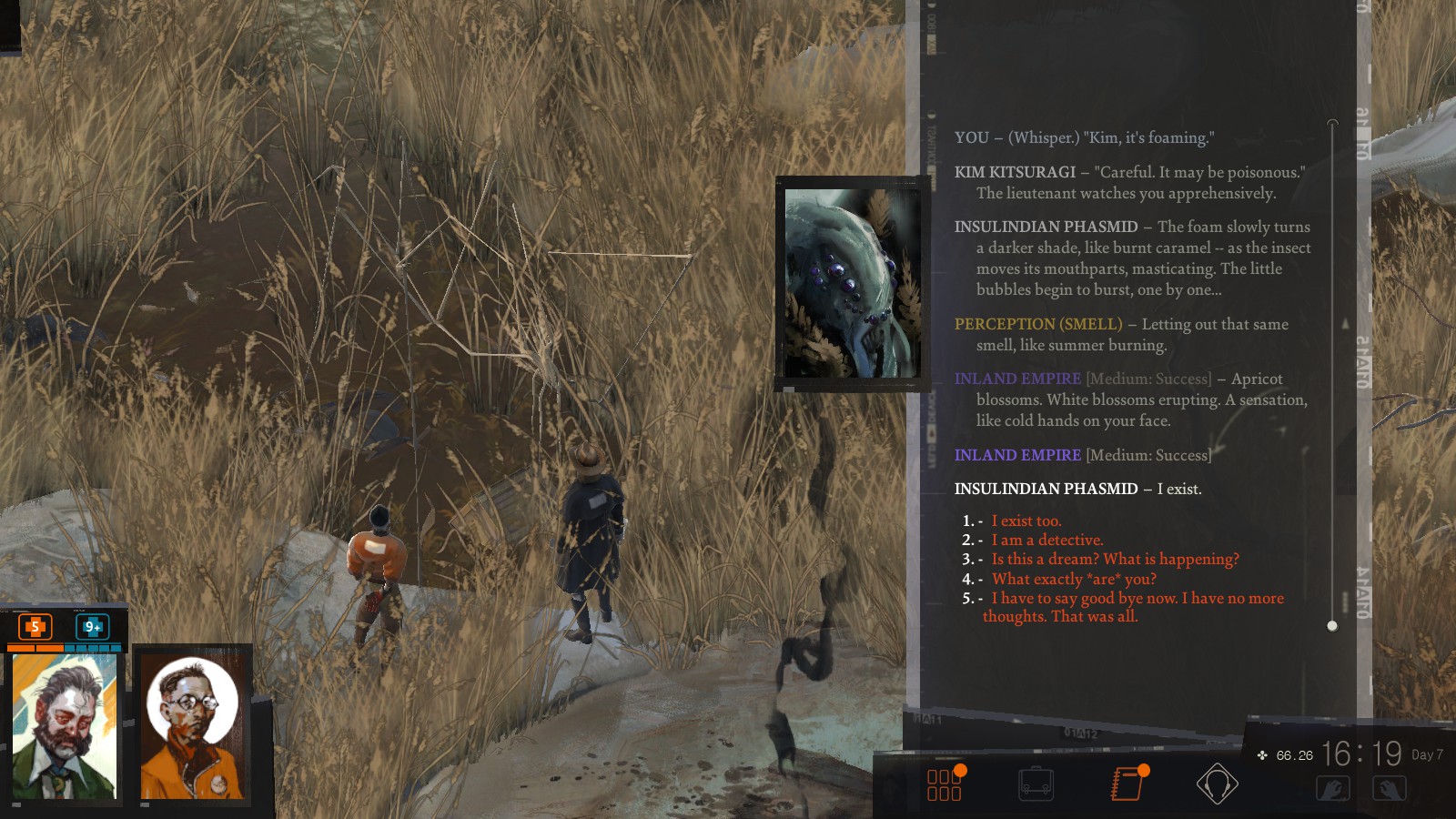
The conversation with the phasmid is a meeting point of emotional sincerity and of communism. Though there are different ways it can go depending on how you’ve played, for me—playing as close to an optimistic, communist cop as I could get—I got a taste of what I had been aching for in the whole game. To feel that there was more than relentless skepticism at the possibility of a better world and a better life. That Disco could cast off the armor it had used to cover those twin strands that should form a close knot, of sincerity, and of a belief in communism.
Just between Harry and the phasmid, an invisible psychic communication that no one else in the world can hear, you get to speak of emotion, of fear, pain, hope and hurt. You get to speak of failures past, of dangers now, and how there can still be a brighter future. It goes well beyond words that open up the heart but could end in nothing but vague platitudes—generic messages of peace and kindness, afterschool special words of sharing—and into directly talking about class. The phasmid tells you of the emotional scar that’s been cutting through Harry for over half a decade. A relationship gone wrong, the woman he was so attached to leaving him behind, Harry tearing himself apart night after night, year after year for it.
The phasmid tells you to leave her behind. Of how it would’ve never worked out. Paraphrased: You’re a working class guy. She was an uptown girl. Not only would it have never worked out, but your solidarity should be elsewhere.
There is a strange hopefulness to the phasmid, even at its most bleak. When describing humanity as something that could eliminate all of its existence, having brought about a world destroying nothingness called The Pale, the phasmid still never has the bitterness that Harry does, that so much of the world does, that would cause the creature to be cautious about its feelings. The phasmid is simply a “median creature”, after all, and not something complex and unpredictable like humanity, which it describes as a “violent and irrepressible miracle”.
The phasmid does not have the internal gears of a human, all the millions of neurons that make up Harry’s Thought Cabinet, so it does not speak or act with all these defensive measures and tactics to bury fear and hope under layers of obfuscation the way Harry, Kim, Cuno and Revachol itself does. It is honest and straightforward about all of these aspects of itself.
The insect’s heart is on its sleeve.
Eventually the conversation comes to an end, skittering back into the reeds to live its life. You bring the killer back to shore, meet with your own police force where the ending of the game plays out, going through a performance review of your job as a detective, with the best possible result being getting back on the force and inviting your much beloved friend Kim to come along with you. Maybe you can do some real good this time around.
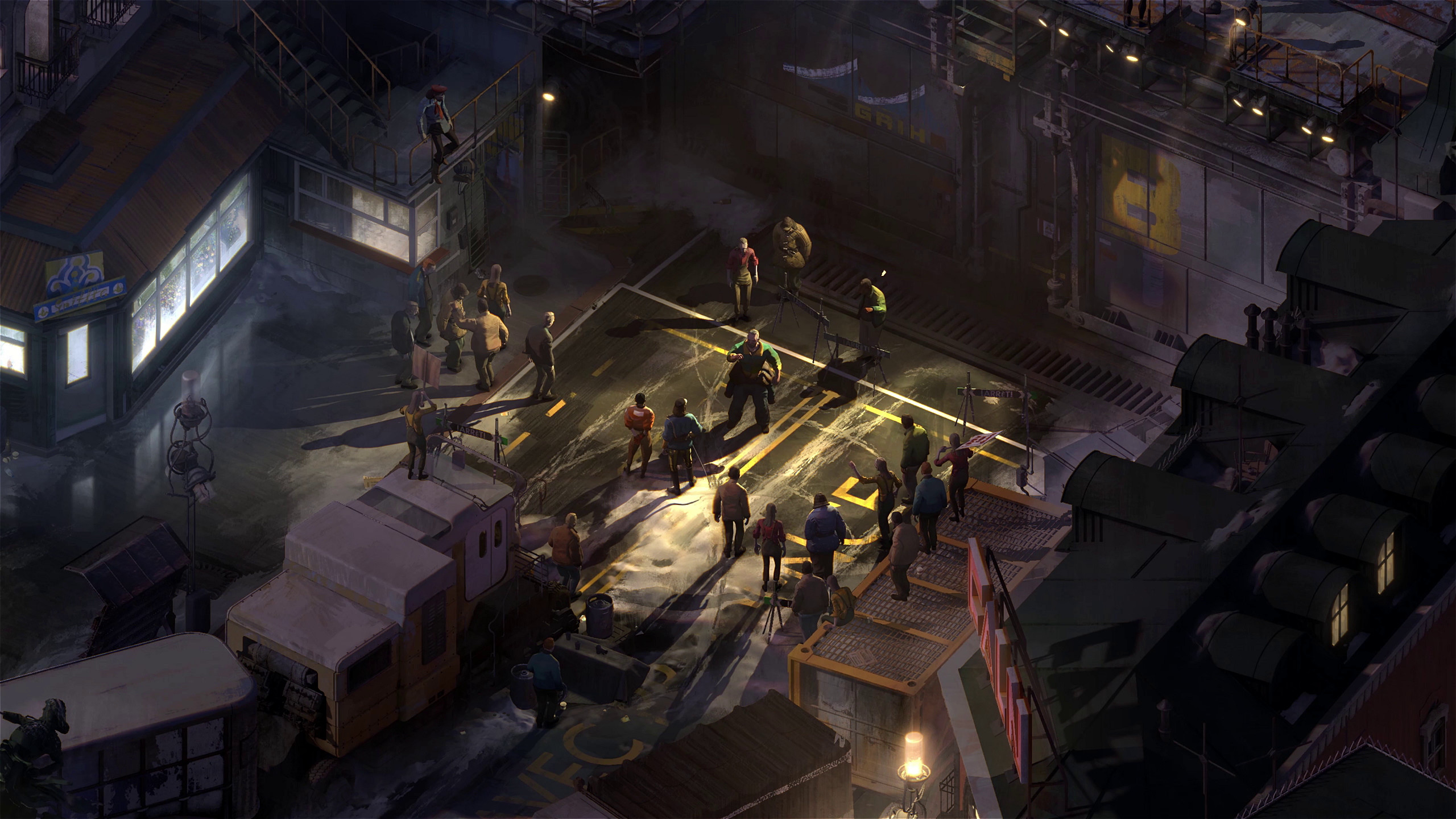
Then, roll credits.
It's a beautiful ending, but on reflection, a deeply telling one. The game's only moment of vulnerability comes from a bug. A bug that wasn’t supposed to exist.
Disco Elysium might finally have been speaking from the heart, but it refused to do so from within the body of a human being. There’s something too real and physical about humans, something heavy with gravity. You put the words of communism inside a human and then communism is something real you fully have to reconcile with. You put it in the mouth of a grand, nearly invisible bug? Then it’s a dream.
A wonderful dream, yes, but a dream nonetheless. Disco Elysium was only willing to get this vulnerable and hopeful in the wrappings of a bug that shouldn’t exist, in a conversation that nobody else in the world of the game will ever hear. It's like having Mr. Snuffleupagus explain how "communism works in theory, but...”
This is all reinforced with the last scene. You’re not going out to fight the revolution: you’re going back to being a cop. You’re going to try and be a good cop, but you’re still a cop, and this is where you’re ending up even after the phasmid told you to “do it for the working class”. You are returning to a status quo with a better perspective, but you are not shooting for the personal, material change that’s necessary for Harry, for Revachol, to chase and fight for that belief in communism. Where it dares to dream of enduring change is localized to the police station that Harry reports to. You don’t have to look at our real world to know that trying to have ‘good cops’, to the extent that such a thing could exist, is not going to build the bridge towards a truly better world; Disco itself insults this idea near the very beginning when an answer you can give on the politics of its world is that “We are living in the cop regime”. A more effective and personally nicer brand of law enforcement is still going to end with a boot on people’s necks.
Disco Elysium gets so close, but the pain and failure that has shocked the revolutions of our own world spills right into the story of this one. This journey's climax doesn’t disappoint me for being abrupt, but because it flinches. It looks away and it dials down its expectations and its hopes. From communism to personal kindness, from revolution to ‘a decent police department, maybe’. It knows it should ask for more, but Harry and Revachol tried that once before. Once bitten, twice shy, both remain too haunted by their fears of personal and political failure to take any more chances.
from VICE US https://ift.tt/2EQCaoG
via cheap web hosting
No comments:
Post a Comment